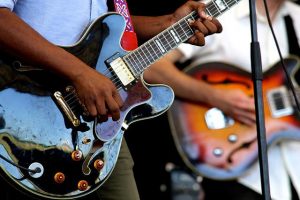
All the online music platforms examined are characterized by the fact that relationships within user groups have the highest priority. The establishment of relationships between people via the net is closely linked to active music practice, whereby the musical preferences of the participants are taken as a starting point. Some platforms seem to allow a spontaneous entry like on Reddit where you can get upvotes from people in your community (How Reddit Upvote Works? Read this article for more details!), others are more integrated into professional contexts. Many users of music platforms generally apply traditional criteria to the resulting music in the digital space and use the net pragmatically. Familiar musical practices such as rehearsals and jams as well as the use of notation programs and music studio applications are (experimentally) transferred to the medium of the Internet.
Even experienced musicians address hurdles in the technical design of interpersonal interaction on the platforms. In addition, workshops show that the use is also unusual for technically experienced young people and that the technologies must first be acquired by them. The expectation “It’s the same, only online!” turns out to be a fallacy in practice. This has consequences:
- The fear that online music platforms could replace face-to-face lessons or joint studio meetings on an equal footing is exposed as a hollow and unnecessary phrase. Apples are compared with pears.
- Simply transferring traditional methods to the online sector is questionable. Alternative methods must be developed if one wants to be effectively artistically and pedagogically active. Superficially, the conditions for interaction require a rethink. The knowledge of music, related to basic musical and technical questions, initially seems to be less conspicuously influenced by the medium.
In order to better understand the peculiarities of network media, it is worth saying goodbye to the widespread view that such network media, as presented here, are to be understood as tools or tools. Online platforms are more than a neutral means to an end. Rather, they act as mediators who (co-)shape the conditions and process of music design. Media theory emphasizes that the medium always performs a strong constitutive performance for the process, the product, and mutual perception.
The Internet is therefore to be regarded as an independent, virtual space in which not only everyday things are depicted. In it, sound, visible and physical interaction spread differently than in physical space. There are laws whose effect does not simply result from the operation of interfaces. If you want to use opportunities to make music at a distance, you must therefore be willing to engage in a research process and make the digital world “habitable” bit by bit.
Typing
The selection of the considered forms and concrete examples on online music platforms of the broad-based investigation took place regardless of whether they can be assigned to pop music genres, experimental music, or classical art music, and independently of quality judgments. The central selection criteria of the analyzed online music platforms3 were two aspects:
1. The role of the Internet for collaborative interaction between the participants goes beyond sending (e.g. by e-mail or Dropbox) or making files available in archives (e.g. podcast and sheet music collections for download).
2. Structures have been established that are used by several people to interact with each other dialogically.
This excluded applications such as Chrome Music Lab or Groove Pizza from the investigation because they can be used interactively in the browser to make music, but do not offer opportunities for sharing. Rather, the focus is on websites that provide conditions that enable the establishment and maintenance of relationships within user groups in order to enter into a collaborative and dialogical exchange.
The typification presented below is based on basic musical practices that can be found on the net in the differentiation of the respective characteristics. It is based on four basic types of music-related practices on the Net that are geared towards collaboration. The two types of use of online music platforms for making music together (“The net as a rehearsal room”) and for synchronized music experience (“The net as a concert stage”) were already presented in the previous issue of this magazine.
ALSO READ: How DJs Can Leverage Social Media
3. The Net as a Production Tool – Collaborative Music Making
From the first two forms of musical practice on the net, in which directly related interactions in the here and now are of central importance, production tools must be distinguished that enable collaborative forms and can take place asynchronously – i.e. independently of each other in terms of time. Instead of an execution-oriented interaction, the representatives of the third and fourth types focus on a dialogical reference that is primarily conveyed symbolically (e.g. in the form of notes, sequencer tracks, or text).
This form of collaborative development of music pieces means the production of a composition with the result of a score, but also the production of instrumental tracks and songs – e.g. in the studio using DAW software – with a recording as a result. In contrast to the widespread image of the lonely composer or the lonely home studio producer, specific practices have developed on the net, which operates under the term “collabs”. Forums such as fawm.org or websites such as Kompoz are often used as a collaboration platform. Recordings, mixes, sheet music, texts, video cuts, and other musical material are sent via the Internet, whereby compositional additions, music recordings, and cyclical revision loops of the joint material with many participants can be undertaken. With this form of collaboration, however, it can be very time-consuming if the project is worked on in parallel and project iterations that have been created in parallel in different local studios have to be brought together.
A more modern approach is offered by online platforms such as BandLab, which offers a studio environment (consisting of e.g. sequencer, sample library, effect devices, and software instruments) to become productive directly on the net – making the network a workshop. Notation software for composing is also available as an online version (e.g. Noteflight and Flat.io), which can be accessed via the browser. All project files and even the sound recordings remain on the network, which means that they can be accessed on any device and access can also be granted to individual profiles or groups.
With such music platforms, dialogical processes in composition and production can be given a different weight than in working methods in which individual recordings or (project) files are sent back and forth. On the one hand, collaborators can create material for the joint project. On the other hand, by taking place directly on the net, the collaborative process can make the interim results visible to others for inspiration. All project participants can develop their own interpretations of the currently available material, which in turn can be taken up, commented on, and further developed.
4. The Net as a Forum – Exchange Language
The fourth form of musical practice on the Net, which is geared towards collaboration, focuses on linguistic exchange (as text, as voice recording, or as a video response) and can be found in Internet forums and in comment areas of music blogs. In forums such as musiktreff.info, the largest German-language brass music forum, for example, playing techniques are exchanged and hardware and music recordings are discussed. Participation is thematically bound, to which references take place at a staggered time. I would also like to include such music-related practices in the systematics of this article in the typification since the exchange with other users in the form of feedback up to intensive discussions decisively determines the practice of music and can be a component of learning.
Such social media platforms can also be counted among them, which are based on the principle of “user-generated content”, such as YouTube or ultimate-guitar.com. Often, the uploaded sheet music, videos, podcasts, or photos are a starting point from which discussions in the comments section arise.


 Moreover, a rehearsal-friendly storage facility will not be as friendly the moment a renter starts missing a payment. Operators will immediately serve a defaulting renter with a demand letter, indicating the deadline up to when payment must be made. Otherwise, the defaulting renter will be locked out of the storage unit in preparation to putting up the content of the storage for auction sale.
Moreover, a rehearsal-friendly storage facility will not be as friendly the moment a renter starts missing a payment. Operators will immediately serve a defaulting renter with a demand letter, indicating the deadline up to when payment must be made. Otherwise, the defaulting renter will be locked out of the storage unit in preparation to putting up the content of the storage for auction sale. Running a storage unit requires power, but using a storage for rehearsal does not include using extra electricity to power up instruments used during rehearsals.
Running a storage unit requires power, but using a storage for rehearsal does not include using extra electricity to power up instruments used during rehearsals. Noise can be a problem, especially in rural areas. A storage Horsham operators offer is not likely to permit rehearsals to take place in the facilities, lest they become subjects of complaints for disturbing the peace.
Noise can be a problem, especially in rural areas. A storage Horsham operators offer is not likely to permit rehearsals to take place in the facilities, lest they become subjects of complaints for disturbing the peace.



